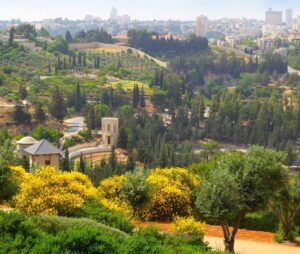On a recent hike to an ancient spring in the Jerusalem hillside with some friends from Chicago, I stopped for a moment and encouraged the kids to behold the physical beauty of what they were seeing.
Lush pine forests crawling up the rolling hills without a single bald spot in the dense timber. Quaint, red-roofed villas clustered together in the picturesque village across the valley. An enormous, state-of-the-art hospital that perched on the cutting edge of biotech research to the south. In my mind, it would be hard to imagine a more prosperous, robust landscape.
Then I asked them to listen to a quote from Mark Twain, the great American writer and humorist as he described one of his international escapades in his 1867 The Innocents Abroad. Omitting the name of the place he is describing, I read:
“We traversed some miles of desolate country whose soil is rich enough, but is given over wholly to weeds — a silent, mournful expanse… A desolation is here that not even imagination can grace…We never saw a human being the whole route…There was hardly a tree or shrub anywhere…Even the olive and the cactus, those fast friends of worthless soil, had almost deserted the country. No landscape exists that is more tiresome to the eye than that which bounds the approaches to________ “Of all the lands there are for dismal scenery, I think_______ must be the prince. The hills are barren, they are dull of color, they are unpicturesque in shape. The valleys are unsightly deserts fringed with a feeble vegetation that has an expression about it of being sorrowful and despondent…It is a hopeless, dreary, heart-broken land.”
“Where was Mark Twain standing when he made these ominous observations?” I challenged them. Silence. I waited a few seconds and encouraged them to wager a guess. Wind rustled through the verdant trees.
“Let’s read it again,” I said, this time filling in the words Jerusalem and Palestine as Twain wrote them in his journal.
“No landscape exists that is more tiresome to the eye than that which bounds the approaches to Jerusalem. Of all the lands there are for dismal scenery, I think Palestine must be the prince.”
“Right here guys! Mark Twain was standing right here. Gazing upon the same hills that you see right now.”

(The rolling hills of Jerusalem with the new city in the distance)
Expressions of disbelief, doubt, and perplexity best describe their reactions, and for good reason. It is hard to imagine any point in time, let alone relatively recent history, where this landscape could have been described as dismal, sorrowful and despondent with barren hills and mournful desolation. How could anyone have ever alleged this striking, picturesque view to be tiresome to the eye?
The truth is, it was.
This entire, magnificent country with its breathtaking views, bucolic scenery, bustling cities and booming high-tech centers was nothing more than a “wasteland with no one to cultivate it or care for it,” as the famed British archeologist Charles Warren wrote when first setting eyes upon the so-called Promised Land in 1870.
So, what happened?
How did a land that French poet Alphonse de Lamartine compared in his 1837 visit to Palestine to “the entombed gates of Pompeii” become one of the most fertile and procreant lands per capita on the planet in a little over 100 years?
From the time the Romans destroyed the Second Commonwealth, 2000 years ago, until Jews started returning home in the 1880’s, not less than 13 empires tried to settle this land, each failing and aborting their attempts.
And for one simple reason – they couldn’t urge this stubborn, barren land to produce adequate food to sustain their populations.
This question intrigued me and I set out to find and answer. The blogs that follow will hopefully shed some light upon this mystery.








Can I simply say what a comfort to find someone who actually understands what they are discussing on the net. You definitely understand how to bring an issue to light and make it important. More people should check this out and understand this side of the story. I was surprised that you are not more popular since you most certainly have the gift.